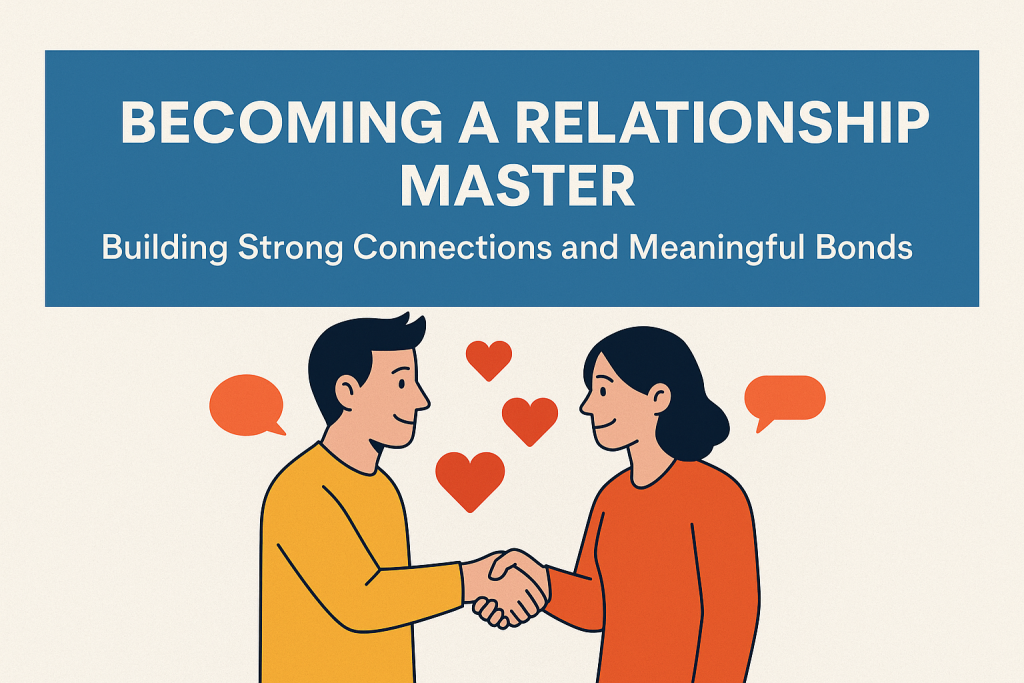Building Strong Connections and Meaningful Bonds
Human relationships are the foundation of personal happiness, professional success, and societal harmony. Whether they are friendships, romantic connections, familial ties, or professional interactions, mastering relationships requires intentionality, empathy, and skill. To become a “relationship master” is not about manipulation or control but about understanding, nurturing, and enriching every interaction. Here’s a roadmap to help you on this transformative journey.
1. Embrace Active Listening
Listening is more than hearing words; it is about understanding the underlying emotions, meanings, and intentions. A relationship master listens to their partner, friend, or colleague with full attention and without interruption.
Practical Tips:
- Maintain eye contact and show genuine interest in what the other person is saying.
- Refrain from planning your response while the other person is speaking.
- Summarize or paraphrase to confirm your understanding of the conversation.
2. Cultivate Emotional Intelligence
Emotional intelligence (EQ) is the ability to recognize, understand, and manage your emotions and the emotions of others. A high EQ allows you to navigate conflicts, empathize deeply, and respond to situations with poise.
Steps to Develop EQ:
- Practice self-awareness by reflecting on your feelings and triggers.
- Show empathy by considering others’ perspectives and emotions.
- Work on managing impulsive reactions and replacing them with thoughtful responses.
3. Communicate Effectively
Clear and respectful communication is the cornerstone of healthy relationships. Relationship mastery involves expressing thoughts and feelings honestly while being mindful of the impact they may have on others.
Guidelines for Effective Communication:
- Use “I” statements to express your feelings without blaming others (e.g., “I feel upset when…”).
- Be concise and stay focused on the topic at hand.
- Avoid making assumptions; instead, ask questions for clarification.
4. Show Appreciation and Gratitude
Acknowledging the efforts, qualities, and contributions of others strengthens bonds and fosters mutual respect. A relationship master makes gratitude a habit.
How to Practice Gratitude:
- Express thanks regularly, whether through words, notes, or actions.
- Celebrate small wins and milestones together.
- Focus on positive aspects of the relationship instead of dwelling on shortcomings.
5. Build Trust and Dependability
Trust is earned through consistent actions and reliability. Without trust, relationships struggle to thrive. Fostering trust requires authenticity, honesty, and a commitment to integrity.
Ways to Build Trust:
- Keep your promises and follow through on commitments.
- Be honest, even when it’s difficult, and admit mistakes gracefully.
- Respect boundaries and confidentiality in all interactions.
6. Navigate Conflict Gracefully
Conflict is inevitable, but how you handle it can either strengthen or weaken a relationship. A relationship master views conflicts as opportunities for growth and understanding.
Conflict Resolution Strategies:
- Remain calm and avoid escalating the situation with harsh words.
- Listen to the other person’s perspective before defending your own.
- Seek solutions that benefit both parties, fostering a win-win outcome.
7. Be Adaptable and Open-Minded
Every relationship is unique, and people change over time. Flexibility enables you to adapt to new circumstances and find harmony despite differences.
How to Cultivate Adaptability:
- Be willing to compromise and meet others halfway.
- Stay curious and open to learning about diverse viewpoints and experiences.
- Adjust your expectations to align with reality, not idealized perceptions.
8. Prioritize Self-Care and Boundaries
You cannot pour from an empty cup. Taking care of your physical, emotional, and mental well-being ensures that you show up as the best version of yourself in relationships.
Self-Care Practices:
- Engage in regular exercise, healthy eating, and sufficient rest.
- Set and communicate boundaries to protect your time and energy.
- Seek support from friends, therapists, or mentors when needed.
9. Learn from Every Relationship
Every interaction, whether positive or negative, offers valuable lessons. Reflecting on these experiences helps you grow and refine your relationship skills.
Reflection Techniques:
- Journal about your interactions and identify patterns in your behavior.
- Seek feedback from trusted individuals to gain fresh perspectives.
- Commit to continuous improvement, even when mistakes are made.
10. Practice Patience and Forgiveness
Strong relationships are built over time and require both patience and forgiveness. No one is perfect, and grace allows relationships to flourish despite imperfections.
Steps to Foster Forgiveness:
- Let go of grudges and focus on moving forward.
- Discuss issues openly to clear misunderstandings or resentment.
- Remember that forgiveness is for your peace of mind as much as for the other person.
Conclusion
Becoming a relationship master is a lifelong journey that involves dedication, vulnerability, and intentional effort. It’s about creating meaningful connections, celebrating differences, and growing together with those around you. By practicing these principles, you can cultivate relationships that are not only fulfilling but also transformative—for yourself and for others. Every step you take toward mastery enriches not just your relationships but the world around you.
Becoming a Relationship Master – Guide to Master Relationships
Understanding the Heart of Connection
Strong relationships don’t just come; they are the results of the deliberate and patient approaches. The concept of relationship mastery revolves around the learning of skills such as trust-building, effective communication and establishing common grounds with those we care about.
Key Skills to Strengthen Relationships
• Active Listening – Pay whole attention, rephrase, and demonstrate true interest.
• Clear Communication – Share emotions and ideas truthfully without blaming.
• Empathy – Understand the feeling of another by picturing their point of view.

